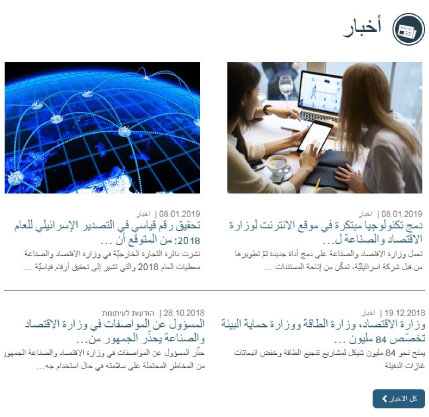 In December 2018, the Knesset Research and Information Center conducted a review of the use of Arabic on government websites, at the request of MK Yousef Jabareen (full report in Hebrew). The review found that many government ministry websites offer limited or no information in Arabic, that accessibility in Arabic is inconsistent among ministries, and little change from 2016, when an evaluation was conducted leading up to a Knesset discussion on the subject.
In December 2018, the Knesset Research and Information Center conducted a review of the use of Arabic on government websites, at the request of MK Yousef Jabareen (full report in Hebrew). The review found that many government ministry websites offer limited or no information in Arabic, that accessibility in Arabic is inconsistent among ministries, and little change from 2016, when an evaluation was conducted leading up to a Knesset discussion on the subject.
MK Jabareen requested the review in light of the Nation-State Law passed in 2018, which granted the Arabic language “special status” in Israel but committed to enabling access to state services in Arabic by law. The implications of this new status are not yet clear, and the use of Arabic in national institutions has yet to be legally regulated as the law requires.
Access to government information on topics such as services, contact avenues, tenders and employment openings is considered crucial to full participation and communication between citizens and public bodies. A recent report by the Israel Internet Association (full report in Hebrew) on internet use in Arab society, cited in the Knesset update, emphasizes the need for such accessibility and strongly recommends that all government and municipal digital services be made fully available in Arabic.
In 2012, the E-Government Unit of the ICT Authority under the Ministry of Finance published standard guidelines for online government services (Hebrew), which stipulate generally that information such as title pages, online services, forms, and job openings on government websites be available in Arabic. However, these guidelines include no methods for enforcement nor determine the minimal, required scope of accessibility for Arabic speakers, leaving each government ministry to decide independently how or whether to use Arabic on its website.
To assess the current degree and scope of information effectively offered in Arabic on government websites, the Knesset Research and Information Center reviewed the websites of the 24 government ministries of Israel, as well as websites of the State Comptroller of Israel, the government “portal” or information and services website, and four government units: the Civil Services Commission, the Commission for Equal Rights of Persons with Disabilities, the Israel Police, and the National Insurance Institute.
The main findings of the review are as follows:
- Three government ministry websites offer no information in Arabic nor have a translation button for Arabic: the Ministry for Social Equality, the Ministry for the Development of the Periphery, the Negev and the Galilee, and the Ministry of Defense.
- One-quarter of government ministry websites offer only general information on the ministry in Arabic, and in recent years the scope of Arabic information has diminished on some of the websites with the transition to the new online government information and services portal.
- The Ministry of Foreign Affairs and the Ministry of National Infrastructures, Energy and Water Resources, offer no information on staff, departments, or contact avenues in Arabic.
- One-third of the government ministry websites and the Israel Police website only offer limited contact and public inquiry options in Arabic. The Ministry of Finance offers no contact information in Arabic at all. However, since 2016, contact information in Arabic has been added to two government websites: the Ministry of Labor, Social Affairs and Social Services, and the Ministry of Economy.
- Eight government ministry websites and the Israel Police website offer limited or no information in Arabic on regulations, rights, and questions and answers.
- One-quarter of government websites offer no links in Arabic to official documents on laws, regulations and instructions.
- Nearly half of the websites reviewed as well as the Israel Police website offer no forms in Arabic or links to forms in Arabic.
- Four government ministry websites do not publish announcements, tenders, or job openings in Arabic. However, since 2016, two government websites have begun using Arabic in such announcements: the Ministry of Economy and the Ministry of Labor, Social Affairs and Social Services.
Until passage of the Nation-State Law, Arabic was considered one of Israel’s two official languages based on the “Palestine Order in Council,” a pre-state British Mandate Law that was adopted by the State of Israel in 1948. This law required official government ordinances, notices and forms to be published in Arabic. While implementation of this law was partial, over the past two decades the Supreme Court began enforcing it for state institutions. As well, several private bills have been introduced to enforce the use of Arabic on government or public websites in the past, including in the three latest Knesset terms, and most recently in 2015, but none were advanced by the Knesset.
 In December 2018, the Knesset Research and Information Center conducted a review of the use of Arabic on government websites, at the request of MK Yousef Jabareen (
In December 2018, the Knesset Research and Information Center conducted a review of the use of Arabic on government websites, at the request of MK Yousef Jabareen (